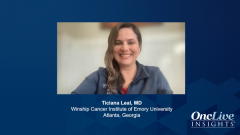
NSCLC: Safety Outcomes from HERTHENA-Lung01
Medical oncologists discuss the toxicity profile of patritumab deruxtecan and the safety outcomes from HERTHENA-Lung01 in non–small cell lung cancer.
Episodes in this series

This is a synopsis of an Insights series featuring Ticiana Leal, MD, of Winship Cancer Institute of Emory University, and Sandip P. Patel, MD, of UC San Diego Health Moores Cancer Center.
Associate Professor and Director of the Thoracic Medical Oncology Program at the Winship Cancer Institute of Emory University Ticiana Leal, MD and Professor of Medical Oncology at the University of California, San Diego Sandip P. Patel, MD discussed safety and efficacy outcomes from the phase 2 HERTHENA-Lung01 trial of the anti-HER3 antibody-drug conjugate (ADC) patritumab deruxtecan in epidermal growth factor receptor (EGFR) tyrosine kinase inhibitor (TKI) resistant non–small cell lung cancer (NSCLC).
Dr. Patel highlighted impressive central nervous system response rate around 30% by non-radiographic criteria, though the chemotherapy payload contributes side effects like nausea, vomiting and myelosuppression. Interstitial lung disease occurred in 5.3% but mostly low grade. With 7.1% treatment discontinuation rate, proactive toxicity education and management will be key to optimize benefit.
Dr. Leal agreed the safety profile looks favorable for an ADC, with typical chemotherapy-related adverse events that can be actively managed and seem less problematic than other similar agents. Myelosuppression rates and severity were acceptable, while most interstitial lung disease cases were low grade. As experience grows utilizing ADCs, discontinuation rates may improve further through appropriate dose modifications.
Both Dr. Patel and Dr. Leal emphasized that while the chemotherapeutic component contributes anticipated effects, each ADC has unique toxicity profiles warranting vigilance. Still, the efficacy signal including central nervous system activity demonstrated thus far for patritumab deruxtecan is encouraging and supports continued research to determine optimal positioning for this HER3 targeting strategy.
*Video synopsis is AI-generated and reviewed by OncLive editorial staff.






































